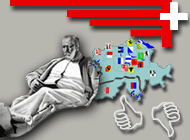Regional divisions in Switzerland highlighted by federal votes

Five federal votes, which took place in Switzerland on Sunday, have highlighted the growing divisions between the country's different language regions, according to Monday's newspapers.
The split was reinforced by the difference in voting patterns between French- and German-speaking areas over a proposal to cut army spending, and two initiatives to introduce a more flexible retirement age.
All three measures were rejected, but most French-speaking areas voted in favour of slashing defence spending. And, along with the Italian-speaking southern canton of Ticino, they also voted in favour of the retirement initiatives.
In all cases, they lost out to the majority in German-speaking Switzerland.
“Le Temps” wrote of the growing chasm in Switzerland. “This weekend, German- and French-Switzerland stuck to their positions like two countries confronting each other,” it wrote.
The “Neue Zurcher Zeitung” concluded that the differences over a flexible retirement age shows that the “economic crisis of the 1990s still affects French- and Italian-Switzerland more deeply than other parts of the country”.
The “TagesAnzeiger” described the splits as “worrying”. It said people living in non-German parts of Switzerland increasingly feel alienated in their home country.
Many papers also speak of a deepening of the “Röstigraben” – a term used to describe the division between French- and German-speaking Switzerland. “When will the French-speakers go it alone?” asks the Zurich-based tabloid “Blick”.
Government ministers welcomed the outcome of the votes, which all went the way the cabinet had recommended. But the interior minister, Ruth Dreifuss, commenting on the pension vote, said the regional differences would have to be taken into account.
Final results from Sunday’s defence spending vote showed 62 per cent against the move to slash the army’s current annual budget of SFr5 billion ($2.75 billion) to just over SFr3 billion ($1.7 billion) over the next decade.
Under the proposal, part of the money saved would have been used for international projects to promote peace, including development aid and disarmament.
The move to be more flexible on the age of retirement was also clearly defeated.
Supporters of the measures had wanted to give people the option of retiring at 62 without losing their right to a full pension. Men in Switzerland are currently eligible for a pension at 65, while the retirement age for women is slightly lower.
The government, parliament and three of the four main political parties had said a flexible retirement age would cost an additional SFr2 billion annually and that this would lead to serious financial problems in the old age pension scheme.
The Swiss electorate also voted on two other federal issues.
They accepted the government’s proposal to abolish the status of civil servants – a move which the more than 100,000 people employed by the federal administration, post office and federal railways, fear could lead to a lack of job security and arbitrary pay settlements.
And they rejected a move by a retail chain to scrap compulsory medical insurance, for everything but hospital costs.
swissinfo with agencies

In compliance with the JTI standards
More: SWI swissinfo.ch certified by the Journalism Trust Initiative
You can find an overview of ongoing debates with our journalists here. Please join us!
If you want to start a conversation about a topic raised in this article or want to report factual errors, email us at english@swissinfo.ch.